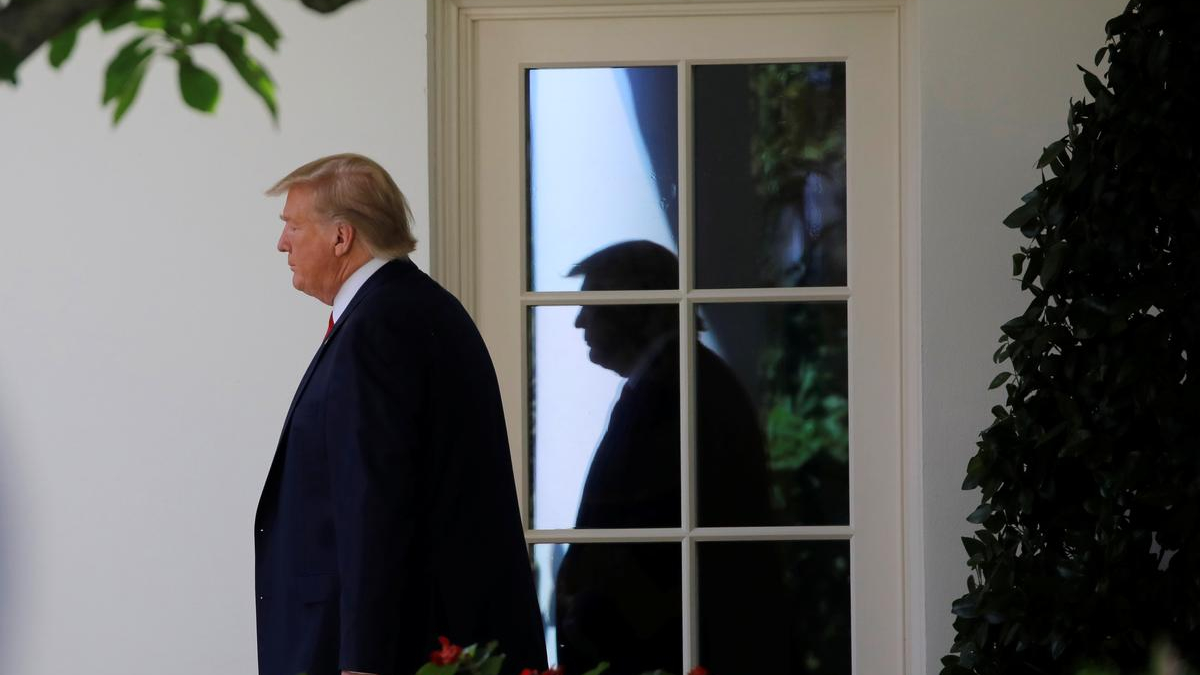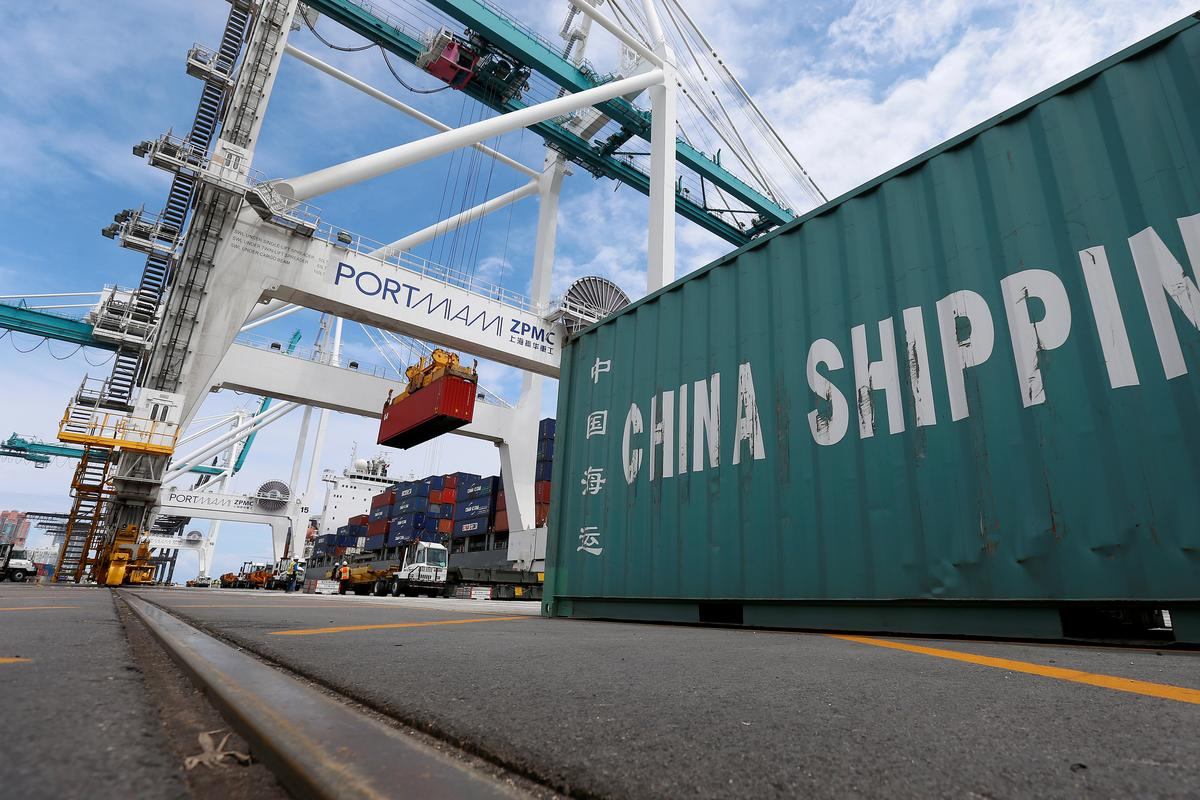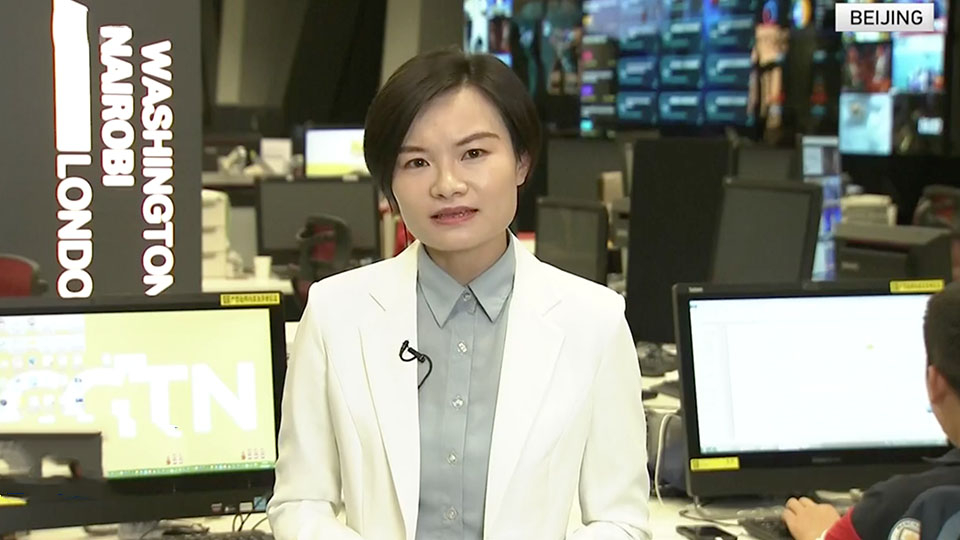

U.S. President Donald Trump's tweet on Thursday, that he will place an additional 10-percent tariffs on the remaining 300 billion U.S. dollars' worth of Chinese imports starting on September 1, has drawn criticism from different perspectives worldwide.
U.S. exports have become "one of the chief victims"
In an article published on Friday, Fred Bergsten, senior fellow and director emeritus at the Peterson Institute for International Economics, said Trump's tariffs have damaged U.S. sales abroad in several ways, the first of which is cutting imports.
"Many U.S. exports depend on imported inputs. Tariffs thus lead to higher costs for exports, raising their prices," said Bergsten.
Second, Trump's import barriers trigger foreign retaliation that cuts U.S. exports directly, and agricultural sales have been hit particularly hard, he said, citing the examples of Europe, Canada, Mexico, Turkey, and China, among other trading partners.

A ship is unloaded using Super Post Panamax cranes in Miami, Florida, U.S., May 19, 2016. /Reuters Photo
Third, the administration's macroeconomic policies have "added to exporters' woes," as the sharp increases in the U.S. budget deficit have kept U.S. interest rates considerably higher than they would otherwise be, which further strengthens the exchange rate of the dollar, depressing foreign markets for U.S. goods and services even more, said Bergsten, who also served as assistant secretary for international affairs of the U.S. Treasury Department.
"Finally, and perhaps most importantly, exporters can be successful only if they are viewed as reliable suppliers. But Trump's trade policies have rendered U.S. firms among the most unreliable in the world," he said, adding that the administration has done "virtually nothing" to support exports.
Read more: U.S. trade deficit shrinks slightly amid escalating trade tensions
"Unless the president reverses course, his trade policy will continue to weaken rather than strengthen the U.S. economy as well as undermine the global trading system," Bergsten said.

U.S. Chamber of Commerce: Tariffs undermine U.S. economy
The U.S.'s largest trade federation, the Chamber of Commerce, said the tariffs will "undermine" the U.S. economy and "inflict greater pain on American businesses, farmers, workers and consumers".
The National Retail Federation, American Apparel and Footwear Association, and many other business lobby groups also say the new tariffs will hit U.S. consumers hard.
Oxford Economics has done the math, and the Associated Press has cited the calculation, that if new tariffs go through, they would cost each U.S. household around 200 U.S. dollars a year. That's on top of the over 800-dollar cost to each household from existing tariffs.
Unchecked, the pinch could be especially painful for U.S. consumers over the holiday season at the end of the year.
Read more: How Trump's latest China tariffs could squeeze U.S. consumers
U.S. tariffs on Chinese imports "worrying" for the global economy
German news agency dpa on Saturday cited German industry association BDI, saying "It is worrying how the U.S. government is going to take the risks of a global recession," adding that the U.S. government continued to fuel the conflict with China.
Stefan Mair, a member of the BDI executive board, said on Friday the continued rotation of the tariff spiral is not only detrimental to the two countries, but also the German industry and the entire global economy.

Containers at a loading terminal in the port of Hamburg, Germany, August 1, 2018. /Reuters Photo
The trade conflict between the U.S. and China is hurting economies around the world. In the end, there will only be losers, BDI said in a statement earlier this week.
German media reported that Trump's announcement has dramatically shaken German stock market, which plunged more than three percent on Friday, slipping below the psychologically important mark of 12,000 points.
U.S. economic, technological decoupling from China hurts innovation
Steve Hoffman, a veteran investor in Silicon Valley, told Xinhua on Friday, that any attempt to decouple the United States from China economically and technologically will surely undermine innovation and hurt cultural exchanges between the two countries.
Although both the United States and China have their due concern about technologies that impact their national security, 98 percent of all technology does not involve security and only involves commerce and lifestyle, Hoffman said.
"In real issues like health, I don't think these things should be separated, and if you separate these things, it will wind up causing a slower innovation," he said.

Steve Hoffman, CEO of Founders Space, gives a keynote speech in Xi'an. /VCG Photo
"Economic and technological separation between the U.S. and China will hurt both economies and wind up really hurting universities that exchange knowledge and research centers in our ability as a human race to make progress," Hoffman said.
Hoffman, also CEO of Founders Space, a leading incubator and accelerator in Silicon Valley, who has successfully facilitated many hi-tech startups in China, said the new round of tariffs will exert a much stronger impact on big companies in Silicon Valley than smaller startups.
"Right now, big companies like Apple, Intel and Microsoft sell their products into China. If China retaliates in an escalating trade war, they will pay the price," he said.
Economic separation and tariffs will push up those prices proportionally, and then American consumers will suffer and pay for the rising prices, said Hoffman.
(With input from Xinhua News Agency)

Copyright © 2018 CGTN. Beijing ICP prepared NO.16065310-3
Copyright © 2018 CGTN. Beijing ICP prepared NO.16065310-3